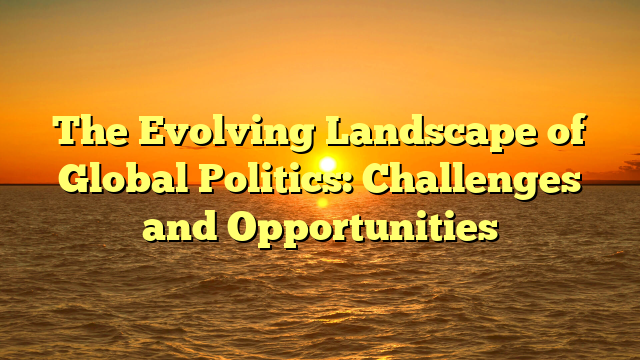In recent years, the global political landscape has undergone significant transformation. Shifting alliances, rising populism, digital influence, and the challenges of climate change and inequality have reshaped the way nations interact, govern, and respond to citizen demands. Politics, once confined largely to national borders and traditional ideologies, has now expanded into a complex, interconnected system driven by both local pressures and global events.
The Rise of Populism and Nationalism
One of the most striking trends in contemporary politics is the rise of populist and nationalist movements. From the United States and Brazil to parts of Europe and Asia, leaders who promise to prioritize national interests, often at the expense of global cooperation, have gained considerable traction. These movements are largely a response to widespread dissatisfaction with political elites, economic inequality, and fears over immigration and cultural change.
Populist leaders often leverage social media to bypass traditional media and speak directly to the public, framing themselves as outsiders fighting against a corrupt or out-of-touch establishment. While this can invigorate democratic participation, it can also lead to polarization and the erosion of democratic norms, such as respect for the rule of law and independent institutions.
Technology and Political Influence
Technology, especially digital platforms, now plays a pivotal role in shaping political discourse. Social media has become a battleground for ideas, misinformation, and political campaigns. While it provides tools for grassroots activism and broader civic engagement, it also presents risks—such as the spread of fake news, political polarization, and foreign interference.
In some cases, governments themselves use digital surveillance and censorship to control dissent and manipulate public opinion. The use of AI-driven tools in election campaigns, targeted advertising, and data collection raises serious ethical and regulatory questions about the future of democratic integrity.
Global Cooperation vs. National Interests
Another significant challenge is the tension between national interests and the need for global cooperation. Issues like climate change, pandemics, and international conflict cannot be addressed by individual countries acting alone. Multilateral institutions such as the United Nations, World Health Organization, and regional blocs like the European Union play a crucial role in facilitating dialogue and coordinated action.
However, in recent years, there has been a growing skepticism toward these institutions, with some countries choosing to withdraw or reduce their involvement. Naga169 -19 pandemic highlighted both the necessity and the fragility of international cooperation. It showed how global crises demand unified responses—but also how easily nationalism and mistrust can undermine them.
Youth Engagement and the Future of Politics
Despite the challenges, there are promising signs of renewal. Youth engagement in politics is on the rise around the world. Young people are increasingly vocal about issues such as climate justice, racial equity, gender rights, and political transparency. Movements like Fridays for Future, Black Lives Matter, and various student-led protests have shown that the next generation is not apathetic, but deeply invested in shaping their future.
This shift brings fresh energy and perspectives into the political arena. However, many young activists still face barriers to meaningful participation, such as lack of representation, limited access to decision-making spaces, and distrust in established political systems. Bridging this gap will be essential for building more inclusive and forward-thinking democracies.
Conclusion
Politics today is more complex and dynamic than ever before. While the world faces numerous challenges—from authoritarianism and misinformation to climate change and inequality—there are also significant opportunities for progress. Rebuilding trust in democratic institutions, fostering informed civic engagement, and promoting global cooperation are key to navigating the future.
In this evolving landscape, active participation, critical thinking, and inclusive dialogue are more important than ever. The politics of tomorrow will be shaped not just by leaders and governments, but by the collective will and actions of people around the world.
